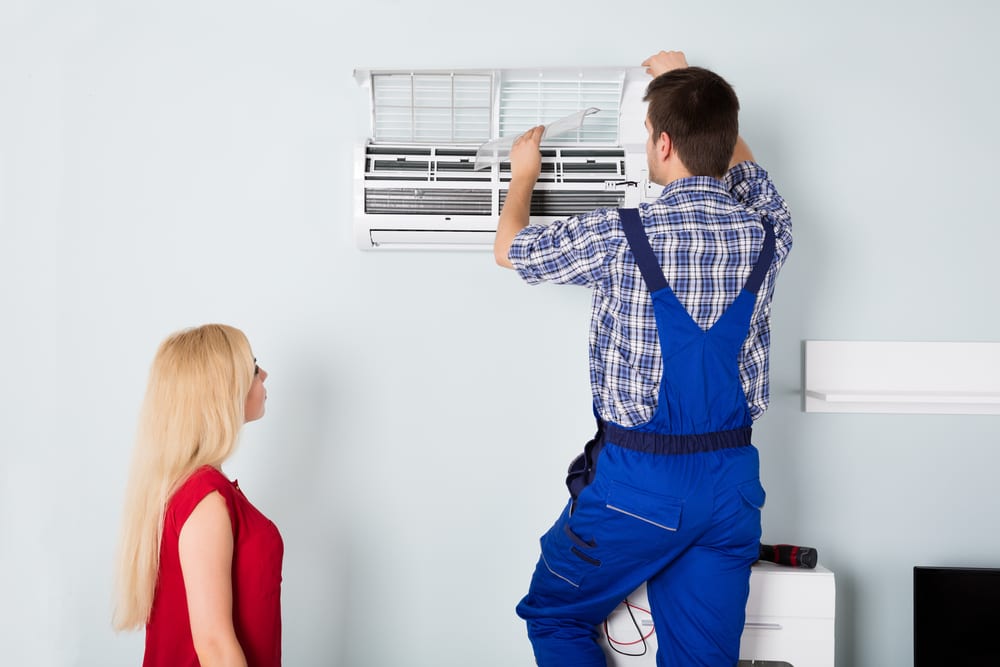Now that warmer temperatures are on their way, it’s a good idea to start getting your home ready for spring. One of the most important steps in de-winterizing your home is to prepare your air conditioner for the coming season.
For most homeowners, by the time that spring arrives, it’s been months since the cooling system has run. During that time, a lot can happen to your AC unit.
With this guide, you can take steps to make sure your AC will be ready to go when you need it. This means more than just making sure your system will turn on.
Springtime often brings a number of allergens, from pollen to cut grass, all of which can end up in your home’s HVAC system. These steps will help to preserve your indoor air quality, as well as keep the temperature comfortable.
While there are some things you can do on your own, it’s always a good idea to have a professional HVAC technician make sure your cooling system is in working order. Your HVAC contractor will have the knowledge and training to find and correct issues that you may not notice on your own.
Clean Off Your AC Unit
Over the course of the winter, it’s common to take a break from your normal yard clearing routines. That means that your air conditioner may have collected leaves, twigs, and other debris in the months since you last used it.
These materials can cause serious problems inside your AC unit, from bending your fan blades to puncturing your coolant coils. Even if they don’t damage your system, they’ll almost certainly make it less efficient.
Dirt is another problem for your air conditioner. In addition to working its way into the moving parts of your system, it can also create havoc in the sensitive electronic parts of your AC.
You may also see dirt built up on your condenser coils, lowering their efficiency. You can try and vacuum off this dust or use a low-pressure hose to rinse them off, but it is usually best to leave the job to a professional.
One option to make your spring prep easier is to purchase a cover for your AC unit. This will help prevent the dirt and debris from collecting in your air conditioner during the months when you’re not using it. That way, when the spring rolls around again, you can simply remove the cover and deal with whatever small amount of debris made it past the cover.
Change or Clean Your Air Filter
The arrival of spring is a great reminder to change your home’s air filters. While you should be checking your filters every 30 to 90 days, you shouldn’t use the same filter for more than three months, and spring is an ideal opportunity to change out the old filters.
When the filter becomes saturated with dirt, dust, and other particulates, it loses its effectiveness. Instead, more and more material will blow into your home, lowering your indoor air quality significantly.
A dirty air filter can restrict airflow, which means that some of the cool air may not be making it into your home. In other words, your AC unit has to work harder to achieve the same result, which raises your utility bills and shortens the life of your air conditioner.
Consider Upgrading Your Thermostat
If you don’t have a programmable thermostat, you should consider upgrading to one that is. This device can allow you to schedule times when your AC won’t have to work so hard, perhaps overnight or when you’re out of the house.
Even better is a smart thermostat, which adapts itself to your lifestyle automatically and provides you detailed information about your energy consumption.
Duct Cleaning & Sealing
Both of these services can help you to save you money while improving your home’s indoor air quality. Professional duct cleaning, which is recommended about every five years, eliminates the dust and debris that builds up over time in your ventilation system, making your air cleaner and increasing airflow.
In duct sealing, your HVAC professional will test your ducts to determine if there are any leaks. Small cracks or holes in your ducts can dramatically impact the effectiveness of your home’s cooling system, allowing air to escape into the walls and ceilings, where it can’t effectively help cool your home.
While you may be tempted to look for leaks yourself and fix them with duct tape, it’s really a job better left to trained professionals. They have special equipment that allows them to track down every leak, as well as advanced sealing systems that last much longer than duct tape, which was never actually intended to repair ducts.
Conduct a Trial Run
Before you turn on your air conditioner to let it run for the entire season, it’s always a good idea to perform a short test.
Before you turn on your unit, you should do some pre-checks. Perform a quick visual inspection and make sure there’s nothing obviously wrong. If you can see a problem during this step, turning on your air conditioner could damage it.
You should also make sure the breaker for your AC unit is turned on, as some homeowners prefer to flip the breaker off during the winter. Finally, make sure your in-home humidifier is turned off since it will be counterproductive to the cooling process.
Once you’ve taken these steps, then you can perform a short trial run. You should run your system for about 30 minutes or so, using your eyes and ears to see that the unit is operating properly. You should also check inside your home to ensure that you’re getting cool air through your vents.
A successful test run shouldn’t be taken as a substitute for a professional inspection of your air conditioner. If anything, it might reveal some information you can give your HVAC technician. However, it can help provide you peace of mind in case you need to run your AC before your annual tune-up.
Schedule Your Professional Annual Maintenance Call
This is the most important step of all in preparing your AC unit for spring. Your HVAC technician should perform a thorough inspection of your equipment, fixing any worn parts and taking care of loose connections. They’re also able to notice potential problems that would likely be missed by the untrained eye, which could end up saving you a bundle down the road.
Your HVAC technician can also perform a more thorough cleaning of your unit, making sure that your coils are pristine and that there’s no dirt around your AC’s electronics. They may even notice debris that escaped your initial clearing.
After your HVAC tune-up, you should be able to rely on your unit to provide you cool air all season long. But there are other reasons to get an annual tune-up, too. For one, your unit will be more efficient at cooling your home. A tune-up also helps extend the life of your unit.
If your air conditioner is still under warranty, you may need proof of annual service to keep your warranty valid. But most of all, your annual tune-up means that it’s much less likely that you’re going to need a repair in the middle of the season usually on the hottest day of the year!
If you’re looking for an HVAC technician to perform your annual AC tune-up, contact the experts at Castle Home Comfort Heating & Cooling, and we’ll schedule your next AC service today!

